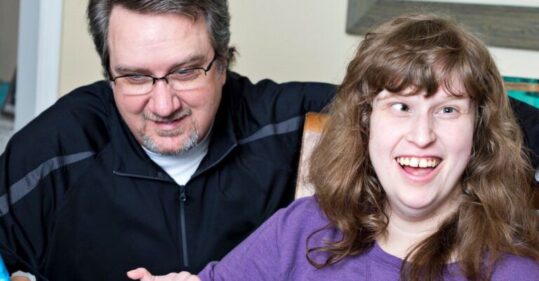Learning disability nurses key in overcoming ‘profound disparities’ in health service access

The declining number of learning disability nurses has been flagged as a key challenge in healthcare access for people with a learning disability, as part of a new health think tank report.
It is also ‘not clear how proactive’ GP practices are in encouraging people with a learning disability to attend annual health checks or to ‘what extent’ practices support follow-ups or referrals for patients, the report published by the Nuffield Trust this week suggested.
Overarchingly, the Preventing people with a learning disability from dying too young report warned ‘vital opportunities’ for people with a learning disability are being missed due to ‘profound disparities in access to health services’.
It suggested that opportunities are ‘too often being missed as a result of disjointed care, and information and communication that are not well suited to the people they are being provided to’.
The report looked at five key healthcare services in England that people with a learning disability should have access to – including obesity, cancer screening, mental health, annual health checks, and early diagnosis – assessing how well these services are working for this group.
It found ‘clear evidence’ that this group of patients was ‘not always able to get equitable preventive support’.
Related Article: New preceptorship package for social care nurses
Citing NHS data, it noted that people with a learning disability are more likely to be obese, have lower levels of participation in NHS cancer screening programmes, and are disproportionately affected by mental health problems, but less able to access suitable care and more likely to be overprescribed medication.
In addition, the report highlighted ‘barriers’ around access healthcare among people with a learning disability and issues around ‘understanding the health system and which services to turn to for support for various health problems or concerns’.
‘Roles such as learning disability liaison nurses can help address these challenges,’ it suggested.
And it pointed to previous Learning from Lives and Deaths’ (LeDeR) reviews which spotlighted the role as ‘a valuable one for connecting care’.
‘However, with the workforce declining in numbers, it is becoming increasingly difficult for learning disability nurses and community teams to prioritise these activities,’ the document added.
The number of learning disability nurses employed by NHS England has decreased by 42% since 2010, but the report suggested such roles should be expanded with a specific remit to ensure more joined-up and better-communicated care.
The NHS Long Term Workforce Plan includes targets to increase the number of learning disability training places by 46% by 2028/29 and increase the number of learning disability nurses who qualify through the apprenticeship route.
The report also said that GP practices had ‘an important role to play in enabling access to annual health checks and ensuring that they are effective in meeting their aims’.
‘But it is not clear how proactive GP practices are at reaching out to people to encourage attendance at health checks and to what extent they facilitate follow-ups or referrals,’ it added.
‘Evidence suggests that although there has been an improvement in the uptake of annual health checks in recent years for people who are on the learning disability register, there is considerable variation in the quality of the checks and what they include.’
Related Article: Applications to study nursing in England at ‘new low’
And only around 26% of people with a learning disability in England are on the GP learning disability register – a proportion ‘likely to be even lower for people from minority ethnic backgrounds’ – meaning they may not be able to get these checks, the report noted.
According to the report authors, NHS England should conduct a national review to identify good practice and geographical areas needing extra support, and integrated care boards (ICBs) should organise targeted information campaigns to encourage people to join the register, to improve quality of checks and uptake.
‘This under-researched area is especially deserving of greater focus, given that this is a group of people who are often dying prematurely and from avoidable causes,’ the report authors said.
‘Improvements are not being made fast enough and overall care falls short of what is being delivered to the general population.’
Responding to the report, Royal College of Nursing (RCN) professional lead in learning disabilities nursing Jonathan Beebee, said: ‘It is a damning indictment of the way health inequalities have been allowed to flourish that those with learning disabilities are dying much sooner and from preventable causes.’
He said the decline in learning disability nurses was ‘leaving some of the most vulnerable without vital support and putting their health at risk’ and that the government ‘must take action to boost the numbers by incentivising students and paying nurses fairly upon registration’.
‘Failure to do so will only worsen the crisis in learning disability health care,’ he said.
Related Article: Paul Rees appointed as permanent NMC chief executive and registrar
He added that the report should ‘act as a catalyst to invest in this vital part of the nursing workforce and in doing so improve care for those who need it’.
ICBs must ensure they have ‘sufficient representative’ learning disability nurses to support the diversity of their local populations, an NHS report said last year; while MPs were told that learning disability nurses must be placed in ‘all settings and all areas’ to prevent avoidable deaths.
According to the Learning from Lives and Deaths’ (LeDeR) 2022 report, the median age at death for both males and females with a learning disability is 62.9 years, 20 years younger than that of the general population; while 42% of deaths of people with a learning disability that LeDeR reviewed were classified as avoidable, compared with 22% of deaths among the general population.

See how our symptom tool can help you make better sense of patient presentations
Click here to search a symptom




